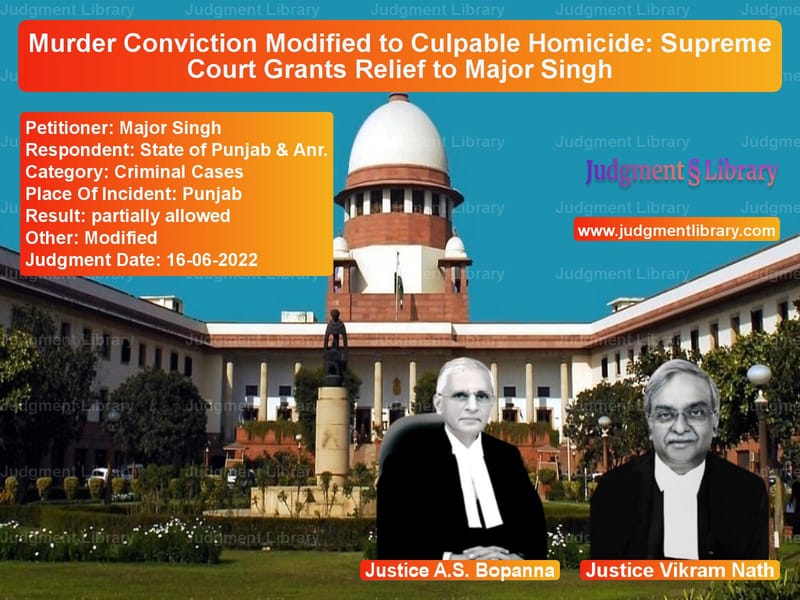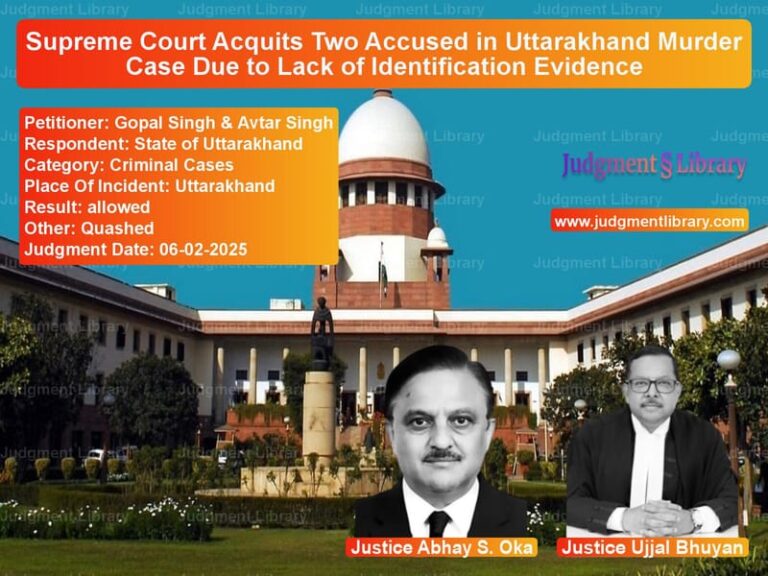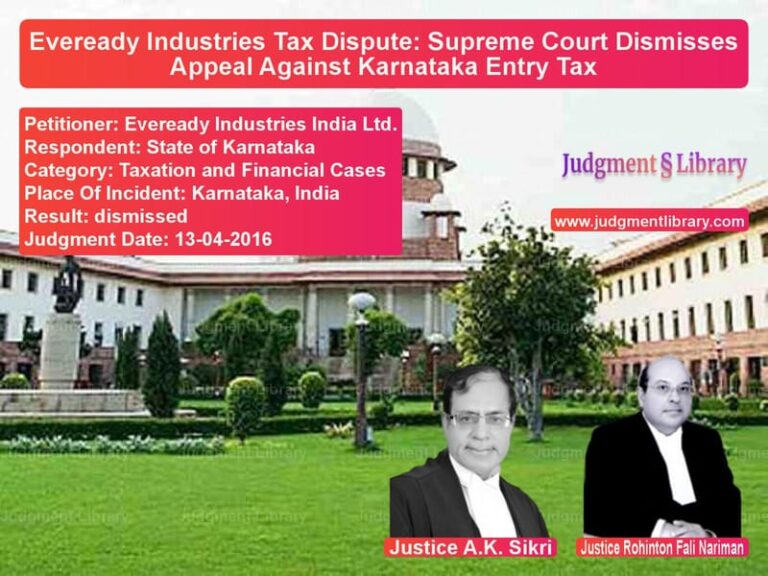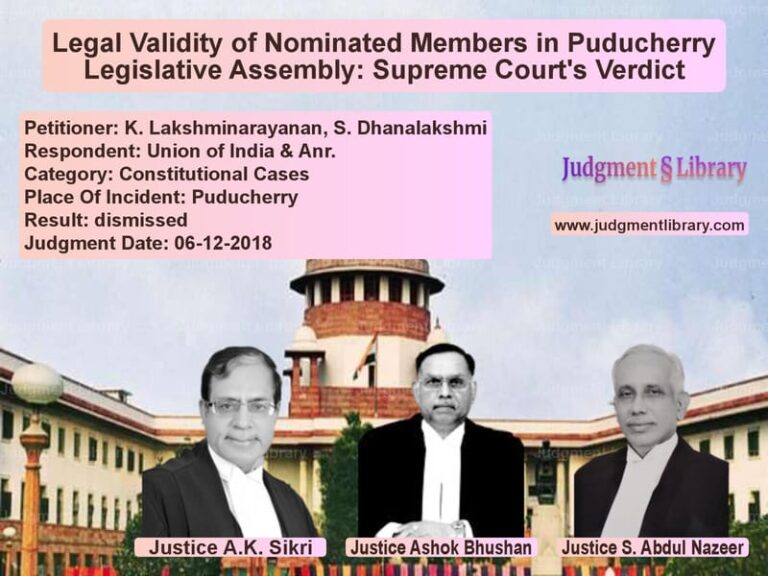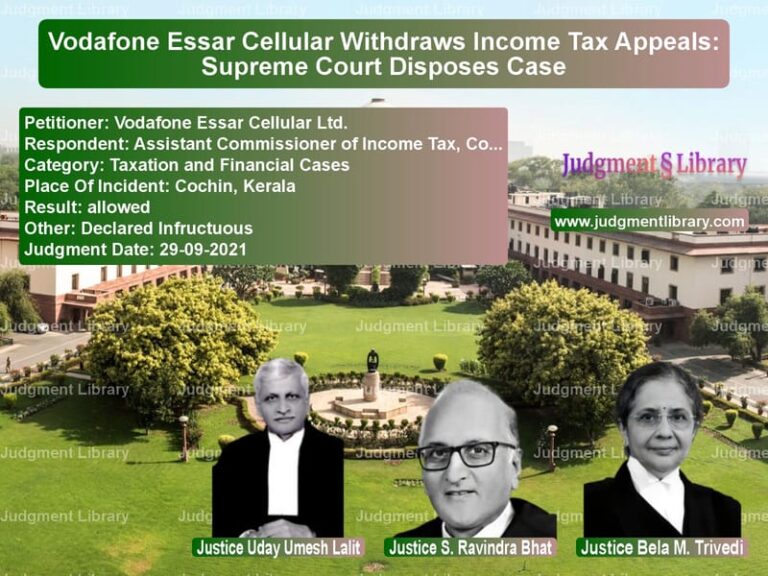Murder Conviction Modified to Culpable Homicide: Supreme Court Grants Relief to Major Singh
The Supreme Court of India recently delivered a significant judgment in the case of Major Singh v. State of Punjab & Anr.. The case revolved around a family dispute that resulted in the death of the victim, Makhan Singh. Initially acquitted by the Trial Court, Major Singh was convicted under Section 302 IPC by the Punjab & Haryana High Court and sentenced to life imprisonment. However, the Supreme Court modified the conviction to culpable homicide not amounting to murder under Section 304 Part-II IPC and reduced his sentence to the period already undergone.
This ruling emphasizes the fine distinction between murder and culpable homicide and the crucial role of intent in determining criminal liability.
Background of the Case
The case arose from an incident on July 21, 1998, in a village in Punjab. The prosecution’s version of events is as follows:
- A day before the incident, Major Singh had a heated altercation with his uncle, Makhan Singh, who reprimanded him for his behavior.
- On the following day, at around 10:30 AM, when Makhan Singh was on his way to the bus stand, Major Singh intercepted him with a wooden cot leg (Bahi).
- Major Singh verbally abused Makhan Singh for reprimanding him the previous day and threatened to teach him a lesson.
- He then struck Makhan Singh on the head with the wooden Bahi, causing him to collapse on the ground with a severe head injury.
- Major Singh fled the scene immediately.
- Makhan Singh’s sons, Sukhraj Singh and Charanjit Singh, who witnessed the incident, rushed him to a local hospital.
- Due to the seriousness of his condition, he was referred to Dayanand Medical College, Ludhiana, where he succumbed to his injuries on July 22, 1998.
Trial and Acquittal
The Trial Court acquitted Major Singh on July 13, 2001, citing multiple inconsistencies in the prosecution’s case:
- Delay in FIR Registration: The FIR was registered 4.5 hours after the incident, raising doubts about the authenticity of the complaint.
- Late Arrest: The accused was arrested after nearly two weeks (on August 9, 1998), suggesting that the police were unsure about the actual perpetrator.
- Inconsistent Medical Evidence: The medical report and the ocular evidence did not entirely match.
- Eye-Witness Credibility: The statements of key witnesses, Sukhraj Singh and Charanjit Singh, were found to be unreliable.
- Unexamined Witnesses: The prosecution failed to present independent witnesses, such as Teja Singh and Darbara Singh, who allegedly saw the incident.
- Contradictory Statements: The medical history at the hospital stated that the deceased had sustained injuries from a scooter accident, raising doubts about the alleged attack.
High Court Conviction
Aggrieved by the acquittal, the State of Punjab and the complainant filed an appeal before the Punjab & Haryana High Court, which overturned the acquittal and convicted Major Singh under Section 302 IPC, sentencing him to life imprisonment with a fine of ₹5,000.
The High Court’s reasoning included:
- Delay in FIR Not Critical: The delay was justified as the complainant prioritized taking his father to the hospital.
- Medical Evidence Was Sufficient: The post-mortem report confirmed that the head injury was fatal.
- Credibility of Witnesses: The High Court found no reason to disbelieve the statements of Sukhraj Singh and Charanjit Singh.
- Premeditation: The High Court ruled that the attack was not sudden and was driven by an earlier grudge.
Supreme Court’s Observations
Major Singh appealed to the Supreme Court, arguing that:
- The incident was not premeditated, and the attack occurred in a sudden quarrel.
- The conviction under Section 302 IPC was too severe and should be reconsidered.
- He had already served eight years in prison, which should be considered for a reduced sentence.
The Supreme Court, after examining the evidence, ruled that the case fell under Section 304 Part-II IPC instead of Section 302 IPC. The Court emphasized:
“The appellant had no intention to kill his uncle. The provocation of being reprimanded the previous day led him to attack the deceased. The weapon used, a wooden Bahi, was not inherently dangerous. Further, there was no repeated assault.”
Final Judgment
The Supreme Court modified the judgment as follows:
- Conviction under Section 302 IPC was set aside.
- Major Singh was convicted under Section 304 Part-II IPC.
- Sentence was reduced to the period already undergone.
- The fine of ₹5,000 imposed by the High Court remained unchanged.
- Major Singh was ordered to be released immediately.
Conclusion
This ruling reinforces the importance of assessing intent in criminal cases. The Supreme Court recognized that while Major Singh’s actions resulted in death, they did not meet the criteria for murder under Section 302 IPC.
The judgment serves as a precedent for distinguishing between culpable homicide amounting to murder and culpable homicide not amounting to murder. The ruling ensures that sentencing remains proportional to the degree of culpability, preventing excessive punishments for unintentional acts.
Petitioner Name: Major Singh.Respondent Name: State of Punjab & Anr..Judgment By: Justice A.S. Bopanna, Justice Vikram Nath.Place Of Incident: Punjab.Judgment Date: 16-06-2022.
Don’t miss out on the full details! Download the complete judgment in PDF format below and gain valuable insights instantly!
Download Judgment: major-singh-vs-state-of-punjab-&-an-supreme-court-of-india-judgment-dated-16-06-2022.pdf
Directly Download Judgment: Directly download this Judgment
See all petitions in Murder Cases
See all petitions in Judgment by A. S. Bopanna
See all petitions in Judgment by Vikram Nath
See all petitions in partially allowed
See all petitions in Modified
See all petitions in supreme court of India judgments June 2022
See all petitions in 2022 judgments
See all posts in Criminal Cases Category
See all allowed petitions in Criminal Cases Category
See all Dismissed petitions in Criminal Cases Category
See all partially allowed petitions in Criminal Cases Category

